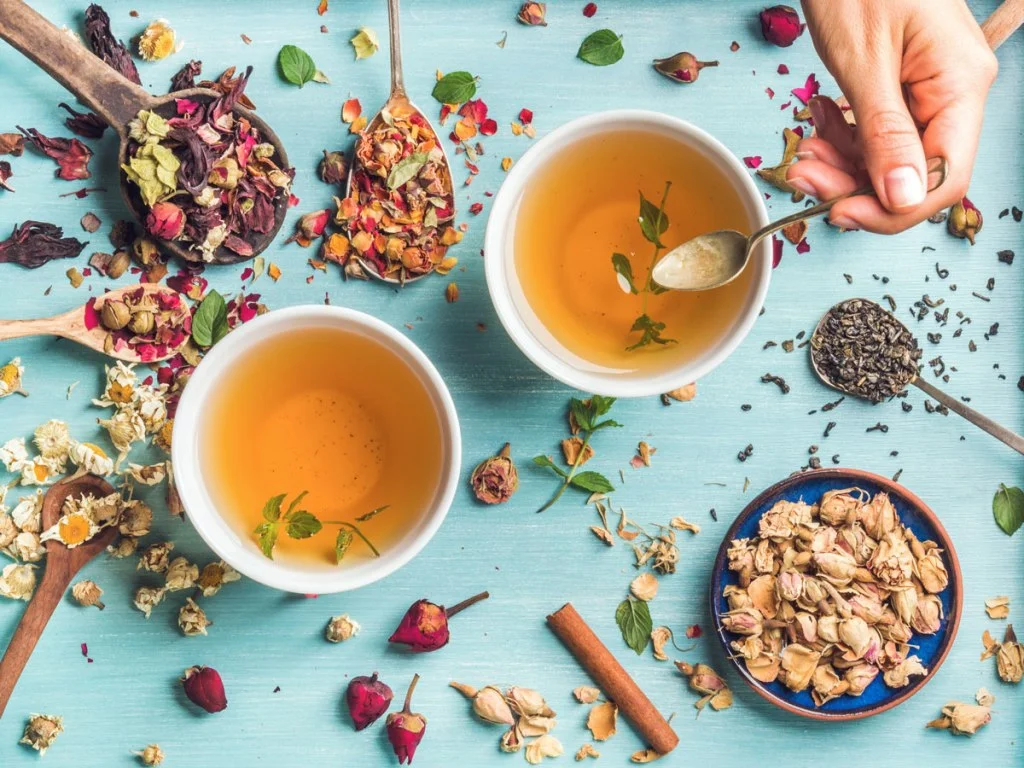4 Ways I use Herbal Teas to Support Health as a Nutrition Therapy Practitioner
Amy Arter is a Certified Nutrition Therapist and the owner of Restored Health and Wellness, where she provides virtual nutrition support to help women overcome digestive issues and support hormone imbalances. With a passion for holistic wellness, Amy empowers her clients to better understand their health and implement practical, nourishing strategies through personalized, root-cause approaches to nutrition and lifestyle. Find out more at: https://
Hi, I’m Amy, a certified Nutrition Therapy Practitioner (NTP). As an NTP, I help individuals get to the root cause of their health concerns and give them personalized strategies to support their bodies, not just putting a band aid on their symptoms. My approach focuses on the five foundations of health: enjoying diverse, nutrient-dense foods, balancing blood sugar, optimizing digestion, managing stress, and prioritizing restful sleep. While nutrient-rich foods form the backbone of my approach, I love incorporating herbal teas as a versatile and effective tool to support my client’s individual needs.
Herbal teas are more than just a warm, comforting beverage – they are powerful resources in promoting health and supporting balance in the body. Here’s how I use them in my practice to support key areas of health:
-
Supporting Sleep with Soothing Herbs
Sleep is foundational to overall health, yet it’s often one of the most overlooked. Incorporating herbal teas with soothing properties into your evening routine can help promote relaxation and prepare your body for restorative sleep.
- Chamomile: Known for its calming properties, chamomile can help ease tension and promote restful sleep. (Moonlight, Evening in Missoula, Cough Calmer, Happy Days)
- Passionflower: Supports relaxation and helps calm a racing mind, making it ideal for those who struggle to fall asleep. (Natural Sleep)
- Lemon Balm: A gentle, calming herb that helps reduce anxiety and supports restful sleep. (Digestive Helper, Happy Days, Tummy Soothe, Lemon Ginger)
A cup of one of these herbs or a blend before bedtime can be a simple step toward optimizing your sleep.
-
Managing Stress with Adaptogenic and Nervine Herbs
Stress is unavoidable in life but chronic stress can be detrimental to our health. I incorporate adaptogenic herbs to help the body respond to stress and calm the nervous system:
- Tulsi (Holy Basil): An adaptogen that helps regulate cortisol levels and promote resilience to stress. (Happy Days, Indian Spiced Chai)
- Lavender: Known for its ability to calm the nervous system and reduce feelings of anxiety. (Moonlight in the Woods, Evening in Missoula, Moringa Mint)
- Ashwagandha: Helps balance stress hormones and improve energy levels, especially during periods of high demand.
These teas can be sipped throughout the day or during times of stress to help bring a sense of ease to the body.
-
Optimizing Digestion with Digestive Herbs
Good digestion is the foundation of health. Herbal teas can be incredible tools for supporting gut health and easing digestive symptoms:
- Peppermint: Helps relax the digestive tract, reducing bloating and soothing an upset stomach. (Moringa Mint, WinterMint, Digestive Helper, Tummy Soothe)
- Ginger: Stimulates digestion, reduces nausea, and eases inflammation in the gut. (Ginger Lemon, Indian Spiced Chai, Great Heart, Turmeric Ginger, Tummy Soothe )
- Fennel: A great herb for alleviating gas and bloating and supporting smooth digestion. (Tummy Soother, Milk Plus, Cold Chaser)
Enjoying a cup of these teas after meals can aid digestion and provide relief from common digestive complaints.
-
Adding Nutrient Density with Herbal Infusions
Herbs are a natural way to boost your intake of essential vitamins, minerals, and antioxidants. Incorporating nutrient-rich herbal teas can be an added benefit to your diet and enhance overall nutrition.
- Nettle Leaf: A rich source of vitamins A, C, and K, along with calcium, iron, and magnesium to support overall health. (Great Heart, Stress Blocker, Momma 2B)
- Raspberry Leaf: High in nutrients like magnesium and potassium, raspberry leaf supports reproductive health and can be especially beneficial for women. (Evening in Missoula, Momma 2B
- Dandelion Leaf: A great herb for liver support, packed with antioxidants and nutrients like potassium and vitamin C. (Great Heart)
Adding in these herbal infusions is an easy and enjoyable way to increase your nutrient intake.
Herbs as Tools in My Program
Herbal teas are versatile tools that enhance a healthy lifestyle, but they aren’t meant to replace foundational practices like eating nutrient-dense whole foods, staying hydrated, and managing stress. Instead, they work alongside these habits to target specific health needs while creating moments of calm and nourishment.
Whether it’s winding down with a calming tea before bed, sipping a digestive blend after a meal, or adding a mineral-rich infusion to your morning routine, herbs can bring balance, comfort, and healing to your daily life.
If you’re curious about how to incorporate herbal teas into your wellness routine or want guidance on supporting your health through nutrition and holistic practices, I’d love to help! Together, we can create a plan that supports your health goals!

